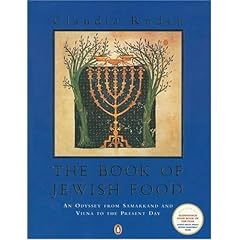
... of Generations past, Vanished Worlds and Identity.
I could not have said that better myself, and I did not - those words are the title of the Introduction to The Book of Jewish Food: an Odyssey from Samarkand and Vilna to the Present Day by the esteemed Claudia Roden.
It is a cookery book given to me by a very dear friend of long standing, whose family welcomed me like one of their own and when my partner came into my life he was as much a part of their family as I had been. Much of our elder generation is gone and we in our turn have taken their places and are adapting their memories and stories - sometimes not realizing that an evening with friends talking lovingly about those not present is part of an oral tradition that is but a faint echo of a vanished world but is a clear marker of our identities.
I value this book, not only because of who gave it me, but for the recipes it contains - Ms Roden's Orange Cake is not only one of the most favored and most savored of my repertoire but has become standard dinner party fare amongst the noshing classes - and for the evocation of worlds gone by.
Let me give you a taste:
"My father died at the age of ninety-four, a few months after my mother. They had spent the last years holding hands, switching from one radio station to another listening to the latest world events, and talking passionately about their life in Egypt. They lived near me in London, and I was the audience for their constant dramatized re-enactments of the stories of all the people they had known. These stories were capable of endless change as new interpretations were explored. At 16 Woodstock Road, it seemed we had never left Cairo.
"The smell of sizzling garlic and crushed coriander seeds in the kitchen, or the rose water in a pudding, and my mother's daily meals, reinforced the feeling ...
" ... Our Cairo had been two cities that turned their backs on each other. One looked like Paris, because Khedive Ismail, who ruled in the middle of the nineteenth century, had wanted to pull Egypt into Europe and had brought in European architects to build it. The other had narrow meandering streets, mausoleums, and public baths; fountains with curvy iron grilles and windows screened by wooden latices; Coptic churches and mosques with minarets rising into the sky like delicately embroidered candles. But our cooking was also from other cities. We made Istanbul pies, Aleppo cracked wheat salads, Castilian almond and orange cakes, egg flans from Fez.
"The Egypt I knew was a French-speaking, cosmopolitan Mediterranean country in which life for the better-off was a sort of continuation of the Belle Epoque in an annexe of Europe, with colonial-style clubs, opera and ballet and entertaining on a grand scale. Egypt had been part of the Ottoman Empire and a British protectorate. It was led by a foreign (Albanian) dynasty, a court made up of exiles from the Turkish aristocracy, and a royal council that spoke limited Arabic. The Jewish community had a happy and important place in the mosaic of minorities - which included Copts, Armenians, Syrian Christians, Maltese, Greeks and Italians, as well as British and French expatriates - living amongst the Muslim majority."
This book is one of my most treasured, not because I'm Jewish - I'm not - but because in personal and symbolic ways it nourishes me.









.JPG)














A wonderful book ~ my boss made several of the recipes for Passover seder recently, including the fava bean soup. Delicious!
ReplyDeleteAs you may gather, I love that book. Immense piece of scholarship! I'll make the fava bean soup this weekend.
ReplyDelete